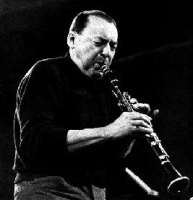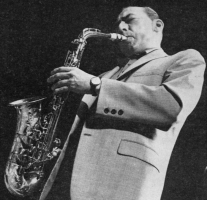
Putting on a show for Woody
Howard Lucraft reports on a very special event in 1987

It was both a very joyous and a very sad event–the special “Tribute to Woody Herman” concert in Los Angeles, just a few days before Woody’s death.
The joy was in the veritable festival of Woody Herman music over the years, presented with so many of the original composers and participants on hand. The sadness was in the knowledge that Woody was dying. His daughter Ingrid, backstage, said to me: “Woody is on life–support. He can’t talk, but he’s certainly not a vegetable. This concert is being broadcast and Woody is listening.” Chuck Niles, Southern California’s leading jazz deejay, who so expertly organised the tribute, had the audience chorusing: “We love you, Woody”, so that the revered bandleader, in his hospital bed, could hear the audience affection.
The programme kicked off with a band of Hollywood studio instrumentalists (many Herman alumni), led by pianist Nat Pierce, playing Woody’s pre–Woodchopper’s signature tune, Blue Flame.
Then came Johnny Mandel, conducting his up–tempo Not Really The Blues. Quoth Mandel: “In fifty years Woody has had more good bands than anyone else. Guys wanted to come with the band because of the great music and great arrangers.”
Ralph Burns came on stage to recall that Woody had asked him: “Why don’t you write a ballad for Stan Getz to play?” Burns obliged then with Early Autumn. On this Autumn 1987 concert tenorist Gordon Brisker essayed a most creditable “Getz.” The “alumni” band then romped with Neal Hefti’s Good Earth, to be followed by the (then) current Herman singer, Polly Podwell, in a jumping All Of Me and a poignant Happiness Is Just A Thing Called Joe that she announced as: “Woody’s favourite ballad.”
It was Shorty Rogers’ turn next. He led the aggregation in his Keen And Peachy, a powerful workout for the alumni, particularly Dick Hafer (tenor), Pete Candoli (trumpet), Jack Nimitz (baritone) and Chuck Flores (drums).
To the delight of everyone, bassist Chubby Jackson then pranced on with Caldonia and other Herman “remembrances” inscribed on his sparkling, custom–made “Woody Herman” pullover. In jolly form, Chubby and Shorty scat–duetted on Lemon Drop. Chubby mugged and danced (without Shorty!) but they both ended up conducting the band together—an uproarious interlude.
Bill Holman appeared, to reveal that, when he once complained to Woody that one of the Holman charts was played too fast, Woody quipped: “Well, start your own band.” Holman retaliated by supplying him with an ultra–frantic arrangement of “After You’ve Gone” that “Woody couldn’t play too fast.” Holman almost did beat it off too fast on this occasion, because it did get a little rocky at one point—but everyone did finish together!
Mary Ann McCall, one of the most famous of the Woody Herman vocalists, emerged from her retirement in the Hollywood hills to revive her Herman hits Wrap Your Troubles In Dreams and Detour Ahead. Jimmy Giuffre wasn’t present, but his Four Brothers saxophone (three tenors and baritone) feature was given a somewhat ragged run–down.
It was “all change” for the bands after intermission when Doc Severinsen and his Tonight Show television orchestra took over. We were treated to the smooth alto of Tommy Newsom in Do Nothing Till You Hear From Me, tenorists Pete Christlieb and Ernie Watts in a pyrotechnical cutting session (Sax Alley), Snooky Young with his trumpet and comedy, and then an express–speed John Bainbridge score on Apple Honey. Comedian Pete Barbutti preceded some pseudo–Errol Garnerish piano by Dudley Moore, who also amused with Colonel Bogey as “done” by Ludwig Van Beethoven.
Movie heart–throb Robert Wagner introduced Rosemary Clooney, who declared: “One of the joys of my life was to make an album with Woody” and she emphasised this with a moving rendition of My Buddy. The vibrant tones of Tony Bennett (with England’s Ralph Sharon at the piano) resounded throughout the auditorium with How Do You Keep The Music Playing. (How do you make it last?) with the answer: The music never ends.
A final Woodchopper’s Ball brought the memorable but heart–rending evening to a close—a night of real music: Woody Herman music. As Woody said to me, a few years ago, over lunch, in Hollywood: “I’ve always been in this business just for the music––never for any fame or fortune.” Farewell, Woody—and God bless you.
Copyright © 1987, Howard Lucraft. All Rights Reserved